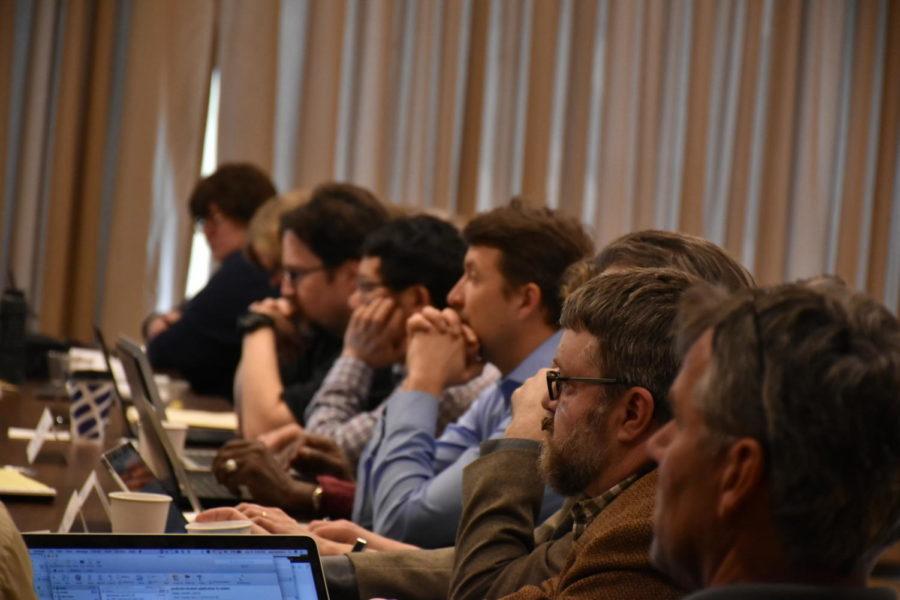- App Content
- App Content / News
- News
- News / Politics And Administration
- News / Politics And Administration / Campus
Faculty senate finalizes NTE proposal
Faculty look on at the monthly Faculty Senate meeting at the Memorial Union on April 17, 2018.
April 17, 2018
The Faculty Senate addressed budget concerns, added new courses of study and finalized the non-tenure eligible faculty, NTE, proposal at their April 17 meeting.
President-elect Peter Martin ran the meeting and opened up talking about a recent meeting with the Board of Regents. Leaders of the Faculty Senate discussed with the regents that Iowa State is asked to “do more with less.”
At the meeting, they asked the Regents for their support as Iowa State is now at the bottom of its peer group in salaries and is witnessing the largest number of faculty resignations in years.
Vice President and Provost Jonathan Wickert reiterated the situation the University faces saying that $4 million of $5.4 million will be centrally covered. This means that only $1.4 million will affect academic affairs and that money will be cut amongst the honors program, CELT, the graduate college, institutional research and the provost office.
For a more in depth look into the cuts look here.
The Faculty Senate then voted on previously proposed programs of study to add starting next fall. These included a doctoral program for education and a certificate in meat science.
Additionally, the Faculty Senate considered a proposal that would excuse military personnel in more situations. The first would be for Military and ROTC orders which often come up on short notice. The second provision would make doctor examinations for military purposes an excusable absence by the university.
Both of the programs of study and the handbook change passed unanimously.
The final, but longest, item that the Faculty Senate looked into was finalizing the proposal for the NTE reform. This included looking over nine different amendments that would change the way faculty progress through the ranks at Iowa State.
Non-tenure eligible faculty are faculty who do not have the same path of advancement as other faculty.
While the debate focused on the definitions behind the “lecturer,” typically known as “term faculty” and the “teaching professor” titles, it also considers a brand new track known as “professors of practice.”
A professor of practice is someone who is hired based on their renown in a specific field rather than having a higher degree. These titles can be specifically advantageous in the hiring process for colleges like business and design as they often have people who distinguish themselves in the field through real-life practice.
The main proposal for the professor of practice track would make it so there is an assistant, associate and full professor of practice; to this there were many amendments.
The first amendment would have gotten rid of the title all together and replace it with “in-resident” or “fellow.” Most, like the Faculty Senate Secretary, opposed the amendment saying that the title was needed to have the advantage over other universities in hiring individuals in the business and design college.
Others, like Sen. Tim Bigelow, said that “fellow is a great way to recognize someone’s accomplishments” while also recognizing that they are like the rest of the faculty. Ultimately this amendment failed.
After the first proposal, there were multiple variations of removing the professor of practice titles. One proposal would have left just the full “professor of practice” title while another would have only removed the “associate professor of practice” title.
Both of these amendments failed for much of the same reason: the college of business and the college of design have already hired people with all three of those titles.
“By limiting the number of titles you limit who we can hire,” said Sen. Frank Montabon.
After two more failed amendments that were along the same line but with the adjusting the lecturer titles, the Faculty Senate heard a solution that was more focused on compromise.
This amendment would retain lecturer and senior lecturer titles, establish a teaching professor track with three ranks (assistant teaching professor, associate teaching professor, teaching professor) and allow qualified senior lecturers to undergo peer review appointment as assistant teaching professors.
This means that professors who start off as non-tenure eligible term faculty can work their way up after a peer reviewed process.
The amendment passed with a little less than one third of the Senate in opposition.
The final provision that will be voted on in the next, and final, Faculty Senate meeting will thus have the above mentioned track for term faculty and will have a separate track for the professors of practice.
















